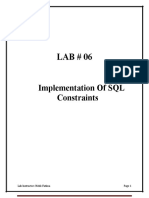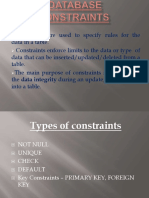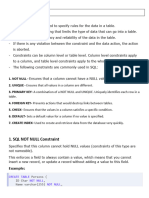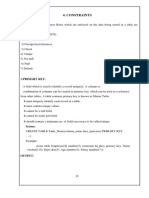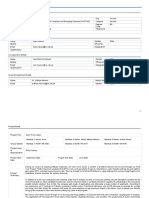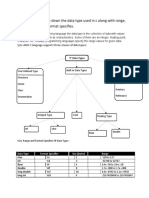0% found this document useful (0 votes)
50 views19 pagesUnit 2 SQL Constraints
SQL constraints can be used to specify rules for data in database tables. Common constraint types include:
- NOT NULL to ensure columns do not contain NULL values
- UNIQUE to ensure each row value is different
- PRIMARY KEY to uniquely identify each row and prevent NULL values
- FOREIGN KEY to link data between tables
- CHECK to validate column values meet conditions
- DEFAULT to provide a set default value for columns if none is specified
Uploaded by
Parth JadhavCopyright
© © All Rights Reserved
We take content rights seriously. If you suspect this is your content, claim it here.
Available Formats
Download as PPT, PDF, TXT or read online on Scribd
0% found this document useful (0 votes)
50 views19 pagesUnit 2 SQL Constraints
SQL constraints can be used to specify rules for data in database tables. Common constraint types include:
- NOT NULL to ensure columns do not contain NULL values
- UNIQUE to ensure each row value is different
- PRIMARY KEY to uniquely identify each row and prevent NULL values
- FOREIGN KEY to link data between tables
- CHECK to validate column values meet conditions
- DEFAULT to provide a set default value for columns if none is specified
Uploaded by
Parth JadhavCopyright
© © All Rights Reserved
We take content rights seriously. If you suspect this is your content, claim it here.
Available Formats
Download as PPT, PDF, TXT or read online on Scribd
/ 19
































